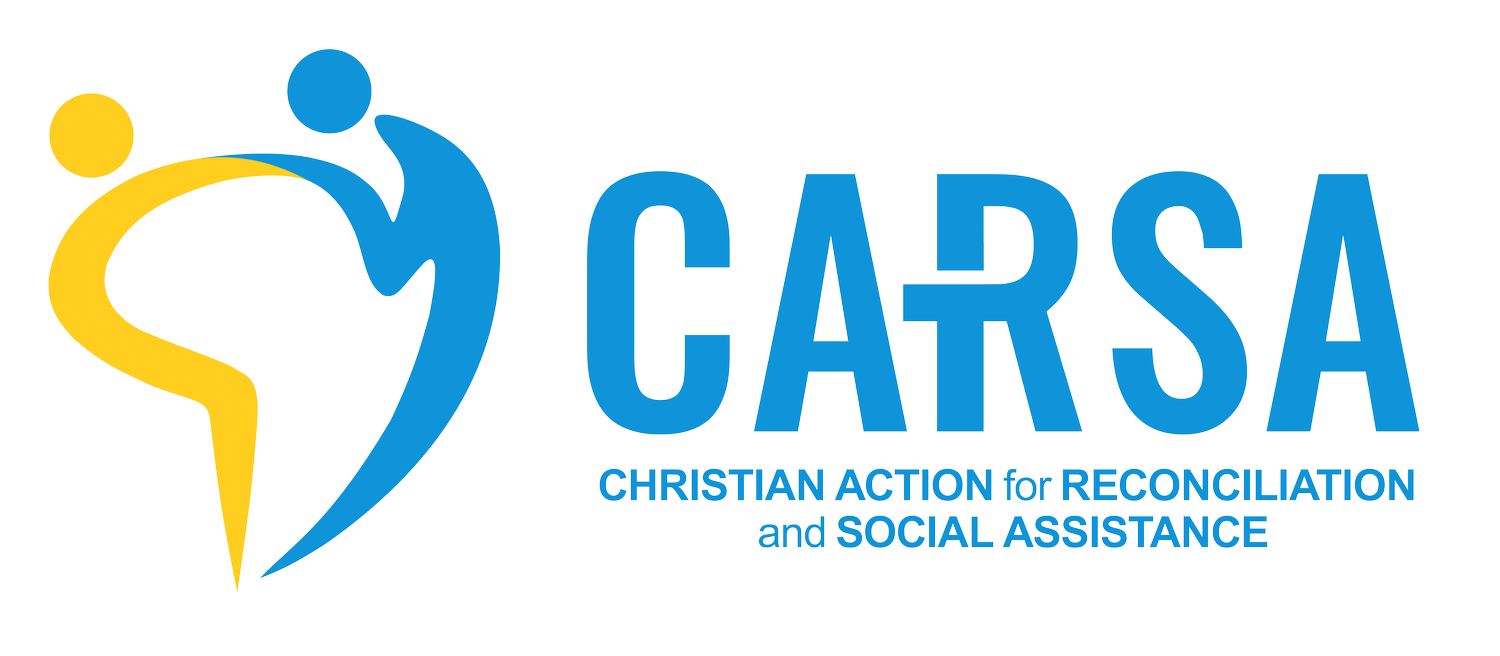PEACE CONFERENCES: Educating young people for lasting peace in Rwanda
The key to long-term peace is educating the next generation. In Rwanda, more than 50% of the population is under the age of 18. Devising initiatives that reach children is absolutely necessary for Rwanda to achieve its commitment to "never again".
In an effort to foster resilient unity, CARSA organized two Peace Conferences this month at the Ruyanza School Complex in Nyarubaka Sector, Kamonyi District, and Mata Complex school in Muhanga District in Rwanda’s south. At these events, CARSA brings two reconciled people — a genocide survivor and their direct perpetrator — to share their stories openly with the group and allow the youth to ask questions to help them understand the circumstances of the tragedy and brainstorm the way forward.
Events like this started around 2015, and these past two conferences brought together 1,405 students. So far, over 30 Peace Clubs have been established in Muhanga and Kamonyi school districts as a result of these talks, giving 5,000 learners a practical platform to develop their own ideas for peace and unity in their community.
”Indangagaciro na Kirazira isoko y'Ubumwe n'Ubudaheranwa bw'Abanyarwanda,” which translates: “Rwanda’s traditional norms to inspire unity and resilience” is a common phrase in the Rwandan government’s post-conflict education plan. Both peace conferences reflected on how norms like patriotism, heroism, integrity, togetherness, etc., had made ancient Rwanda an influential country in the region before the colonials came with a eugenics campaign to transform socio-economic terms like Hutu, Tutsi, and Twa (that previously had a lot of social mobility) into strict, stratified ethnic groups.
Muhirwa
Nsengiyumva
Nsengiyumva and Muhirwa’s testimonies before Ruyanza School Complex’s students
I’ve perpetrated genocide. I have killed. But I have been transformed, so do not fear. Before the genocide, he [Muhirwa] and I were brothers. We traded together and shared beer; we shared everything. But in the genocide, I became an enemy, killing his family members. The leadership of the time encouraged us to kill Tutsi people, telling us that every Tutsi was an enemy. We spent the daytime hunting them everywhere. One day, we found his father at home and murdered him. If we had encountered Muhirwa at home, we could have also slain him.
However, this has not been fortunate for us either. The leaders who had abetted us fled the country, leaving us alone in trouble. When the genocide was stopped, he (Muhirwa) reported that I had committed genocide crimes. I spent 10 years in Muhanga prison. In prison, I never thought that I would return home. During the Gacaca Courts, we confessed to the crime and asked those against whom we had perpetrated crimes for forgiveness and the country in general for pardon. As a result, we were freed, but mutual distrust persisted. I never passed through a place where I could meet Muhirwa. For example, if I saw him coming from a given place, I immediately took the opposite direction to avoid encountering him.
In the beginning, we didn’t believe that it would be possible for us to be sincerely pardoned. CARSA came and talked to me about it, but I initially thought that it was a pure lie. Yet CARSA arranged for me to meet with this brother; I now call him my brother. CARSA nourished us at one table. CARSA then allowed us to talk to each other; afterward, it provided us with a cow that we maintained together. Our children have also become like one family. The genocide occurred while I was aged 32. When I was jailed, my then 7-year was forced into child labor to bring me food in the prison. However, I also now rejoice that my children have studied to the level of university, despite my involvement in the genocide and subsequent poverty.
Nsengiyumva’s testimony before the students
I stand before you to tell you the history that I have experienced. You [the students listening attentively] are told the history, but sometimes those who recount it to you distort it. Before the genocide, Rwandans were characterized by three pacts of friendship: baptism, a cow, and marriage. Hutus and Tutsis exchanged brides and gave cows to one another, and Hutus could choose Tutsi godparents for their children and vice versa.
At school, there were only two Tutsi people — me and another girl. At school, they used to say, “Let the Hutus stand up, and let the Tutsis stand up." Since we were very few, when we stood up, all the children in the classroom looked at us so that they even stigmatized us at school break time.
We are now on the journey of building, and you can’t build while there is one category of people with whom you aren’t together. As he has said, my father was killed, but he wasn’t the only one murdered.
How can a person kill your parent and then sit with you?
We have Resilience Cell groups in our communities where we work in pairs. We work industriously to strengthen unity and reconciliation, not neglecting the struggle for economic development. We are determined to leave you in a division-free country, especially since we are advancing toward the end of our lives.







